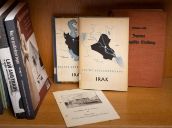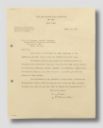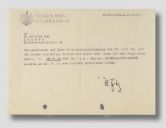Academia is always in motion
The study of the history of the Near East is a relatively small, but very international field, and the NINO’s employees were, and still are, in contact with academics all over the world. Obviously, the war stood in the way of all that. International correspondence was mostly impossible and the exchange of books and journals came to a halt. Except when it came to German colleagues. In order to expand the library of the still very young NINO institute, Arie Kampman tried to exchange publications with the Deutsches Auslandswissenschaftliches Institut.
During the early years of the institute, Arie Kampman worked very hard to collect books for the NINO’s library. A cost-effective method to acquire a diverse collection, was the exchange of self-published works for that of other institutes. It was a job perfectly suited for super networker Kampman. He kept in close contact with academics of leading institutes in countries such as the United States and Germany. The exchange turned the NINO into a small, but very active internationally operating institute. The correspondence of which can be found, of course, in the archive.
Sebastiaan: And what’s kind of funny, is that we have a lot of postcards that have the corners torn out of them, and the stamp gone.
You’re hearing Sebastiaan Bertnsen, archivist at the NINO.
Sebastiaan: And so I have a strong suspicion that one of the children of an employee of the institute collected stamps. And yeah, then it’s an amazing source for stamps coming from all over the world, because the institute really corresponded with every corner of the earth.
The war had a great impact on the international exchange of knowledge, as postal services everywhere were heavily censored.
Sebastiaan: Yes, as the war went on, it became more and more difficult. And, you know, in December of ‘41, the US officially gets involved. And then you start seeing mail getting more difficult. Censuring letters becomes a thing. And we have evidence of that in the archive as well, of things not getting delivered.
Eventually, this would result in academics being completely in the dark regarding the international status of academia. In the archive we find, for example, a note of the suspension of the delivery of The Art Quarterly, until the postal service would start functioning again.
Contact with academics of the Deutsches Auslandswissenschaftliches Institut of the University of Berlin, however, did continue. The research institute studied foreign languages and cultures in the spirit of national socialism.
Sebastiaan: These are academics among each other, and yes, in a way academia in Germany was infiltrated by the system as well. But, well, you kind of just had to accept that.
It seems innocent enough, the exchange of academic books and journals. But it created deeply unsettling situations as well. Like, for instance, the museum library in Hildesheim requesting a book by Egyptologist Herta Mohr.
Sebastiaan: You couldn’t immediately tell from her name, but she was, in fact Jewish. And what I have here is a letter from a museum library, ordering two copies of that book, in what must be ’44. But she had already died in a gas chamber by then.
I do have to correct Sebastiaan a bit here: Herta wasn’t killed in a gas chamber, but instead died of deprivation after the evacuation of Auschwitz. That does not detract in any way, of course, from the gruesome underlying truth – that while her specific knowledge and talent was appreciated, as a person, she was unwanted.



